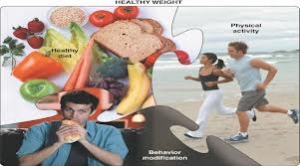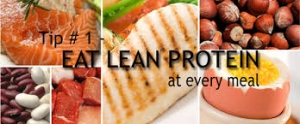Why Am I still Hungry After I have Just Eaten?
 Hey! I thought I would not be hungry after eating now that I have a Lap Band! What gives? This may be what you are thinking and possibly a bit upset and confused. But there is a reasonable explanation for still feeling hungry and a way to resolve this issue from adding some fill to your band to making better choices in the foods you choose to eat and how you eat them.
Hey! I thought I would not be hungry after eating now that I have a Lap Band! What gives? This may be what you are thinking and possibly a bit upset and confused. But there is a reasonable explanation for still feeling hungry and a way to resolve this issue from adding some fill to your band to making better choices in the foods you choose to eat and how you eat them.
First things First
Lets start with how the Lap Band is designed to work. If you are just recently banded (less then six weeks post op) you have NO “fill” in your Band. At the time your band was placed by Dr. Kuri it was completely UN-filled and is to remain UN-filled during the six weeks following the surgery to aid the healing process. During this period your band is not ready to help control your appetite (however swelling from surgery and the post-op diet often will encourage some natural weight loss and loss of appetite). After the six week healing phase and the patient notices that weight loss has slowed or stopped and their appetite has returned it may be time to start the “fill” process. See What is a Lap-Band Adjustment (Fill) and How is it Done?
 I say process because that is exactly what it is, a process to the right fill level, that is just right for you. Because the stomach is a grouchy organ adding a fill to your band can be a slow process and require more then one fill to reach a level that is perfect for the individual. But once you have arrived at that perfect level you will experience how effective your new Lap Band will be at helping to control your hunger. See Is Your Band too Loose, too Tight or Just Right?
I say process because that is exactly what it is, a process to the right fill level, that is just right for you. Because the stomach is a grouchy organ adding a fill to your band can be a slow process and require more then one fill to reach a level that is perfect for the individual. But once you have arrived at that perfect level you will experience how effective your new Lap Band will be at helping to control your hunger. See Is Your Band too Loose, too Tight or Just Right?
But there are of course those pesky 10 Lap Band Rules you need to be following. If you forget or decide you don’t want to follow the rules you will have a tough time getting your fill level right. Take a moment to review these rules, they are your Lap Band owners manual for maintaining and effectively benefiting from your Lap band.
 The Ten Lap Band Rules are basically ten common sense rules to choosing the most effective lifestyle to promote your weight loss and reduce complications after surgery. One of the most common reasons for not being satisfied after eating is due to making poor food choices. “slider” foods, liquid calories, higher calorie foods will all have a different effect on your hunger then if you chose a more filling high protein, and fiber meal. See Tips for putting together healthy menus. Keeping track of what you are eating either by keeping a food diary or taking a picture of your meals may help you see if some changes are needed. See Diet Detective – Starting a Food Journal
The Ten Lap Band Rules are basically ten common sense rules to choosing the most effective lifestyle to promote your weight loss and reduce complications after surgery. One of the most common reasons for not being satisfied after eating is due to making poor food choices. “slider” foods, liquid calories, higher calorie foods will all have a different effect on your hunger then if you chose a more filling high protein, and fiber meal. See Tips for putting together healthy menus. Keeping track of what you are eating either by keeping a food diary or taking a picture of your meals may help you see if some changes are needed. See Diet Detective – Starting a Food Journal
If you are eating a more recommended high protein/fiber type meal (lots of veggies and lean protein) and you have had some weight loss since your last fill (5 to 20lb) and are noticing that when you eat you are still hungry even though you have eaten at least a cup of food, then it may be time to get another small adjustment (fill) added to your Lap Band. This is the only circumstance when you are ready for a fill. Not because you want to force a fast weight loss or you are not losing due to poor food choices. In both cases more fill WILL NOT solve you problem, but will in fact cause one. See Hit The Reset Button. If you are still unclear about this issue we would be more then happy to help you with understanding what steps to take. Call your Patient Facilitator, she is there to help.
False Hunger Signals
Now that we checked with our fill level and choosing the right foods (or wrong foods as the problem may have been) it is time to move onto another reason you may be experiencing hunger after eating “False Hunger Signals”.
If you continue to feel hungry even after you’ve just eaten, your body could be sending you false hunger signals. These signals can be extremely confusing, and often undermine healthy attempts to lose weight. Recognizing and eliminating these false hunger pangs will keep you on track to lose weight and live a healthier life. Try these tricks to curb your appetite and eliminate false hunger.
 Eat Lean Protein Early and Often
Eat Lean Protein Early and Often
Lean protein is an important part of any weight loss program. However, the time of day that you eat your protein matters, as this nutrient is best consumed early in the day. A breakfast which incorporates one ounce of lean protein will keep you fuller and more energized all morning long. But morning is not the only time to focus your meals on protein. Try to add at least one ounce of lean protein (2 to 3 ozs. at main meals) to your meals and snacks to get the benefit of feeling more full for a longer period of time. Protein in your meal really stays with you due to the longer process it takes to digest it. It also burns more calories from this digestive process then carbohydrates, making protein an even better weight loss helper.
 Keep Some Fats
Keep Some Fats
Cutting fat entirely out of your diet can actually hinder weight loss. Some types of fat can help to curb hunger and keep you feeling fuller longer. Small portions of avocados, nuts, olive oil, and peanut butter make excellent appetite-curbing snacks. But keep track of how much of these fat containing foods you are adding each day. They are good choices and are good for you but too much of a good thing can add too many calories and backfire on you. keep your total daily fat take to no more the 30% of your total daily calories. See Six Weeks to a Healthy Diet | Week 4 | Choosing Fats
Exercise Regularly
Physical activity works as a natural hunger suppressant, eliminating hunger pangs for up to two hours after your workout. Aerobic interval training has been shown to have the best effect, keeping you interested in your workout while prompting your body to create the highest levels of appetite-suppressing hormones.
 Choose the Right Snacks
Choose the Right Snacks
Incorporating the right types of snacks into your weight loss program will help keep your stomach satisfied all day long. Skipping snacks can be a recipe for a “out of control appetite”. If you try to over diet by eliminating snacks hoping this will help you to lose faster it wont work. All you do is stoke your appetite furnace and cause you to be twice as hungry at your next meal. Snacks keep your energy levels higher and your hunger under control so you don’t overindulge during meals and are more easily able to recognize when you are full. If you wait too long to eat you may never feel full and keep eating way beyond full.
See Lap Band – Guilt Free Snacking
Head Hunger
There is also an additional way you could be experiencing still being hungry after eating and this one is all in your head.
 Food and Feelings
Food and Feelings
Don’t you just wish sometimes you could just take off a bad mood and replace it with a happy face? Like flipping a different switch to how your day is going. Unfortunately when life gets a bit overwhelming and out of our control, using food to self soothe is a common practice. Perhaps you sometimes eat to cope with stress, distract yourself from difficult emotions, or stuff down feelings you don’t know how to express in a healthier manner. The problem is, if you were not eating out of hunger then how will you know when you are full? Being “done” may have more to do with eating the last spoonful of ice cream or the very last potato chip in the bag before you call it quits. The bottom line is, if you are bound and determined to eat Lap Band or no Lap Band, you will find a way to accomplish it. It is no longer about feeling “full” it is about feeling “better”. and food never accomplishes that goal. See Coping with Head hunger
The Truth About Food Cravings
Craving a big, fluffy hunk of warm bread does not mean your body is deprived of grains. Food cravings have little to do with nutrients and plenty to do with the brain chemistry of pleasure and reward. Cravings may center on texture (creamy, crunchy) or taste (sweet, salty) but they all have something in common — overindulging can sabotage your diet and have nothing to do with being truly hungry but more to do with a “Want” not a “Need”.
More Recommended resources : How does Mindful Eating and the Lap Band Assist you in Weight loss.

